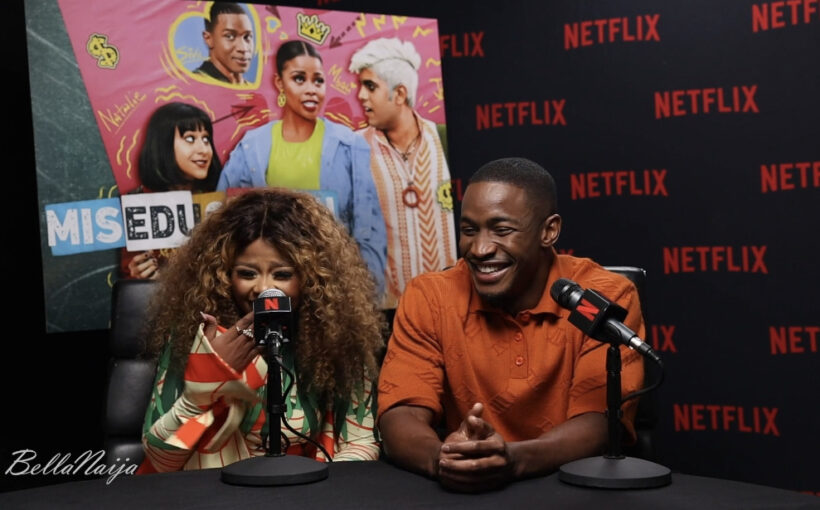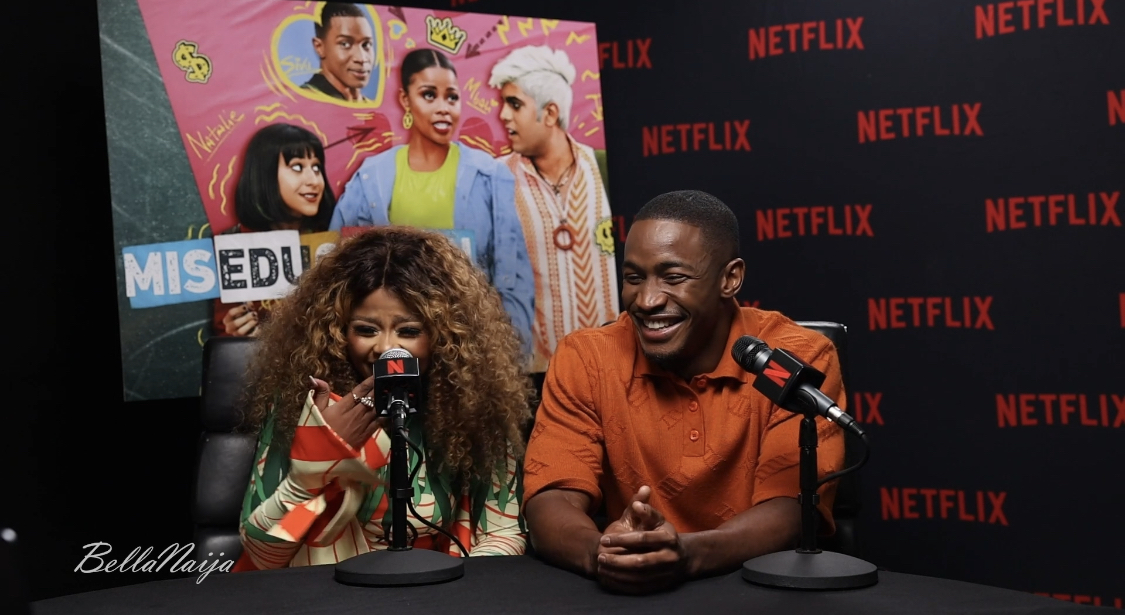
BellaNaija sat down with key cast members of Netflix’s young adult South African series “Miseducation” for an exclusive interview.
The stars talked about life on set, the themes of the show, the importance of safe spaces, what it means to be on a Netflix show, cancel culture, on-screen chemistry, off-screen friendship, and more.
“Miseducation” follows the story of Mbali Hadebe (Buntu Petse), “who finds herself on the cancelled list after the police raid her house and seize her family’s assets because of her mother, Brenda Hadebe’s (Baby Cele’s) corrupt political dealings. Embarrassed and with her tail between her legs, Mbali runs to Grahamstown University in Makhanda, where she strives to reinvent herself and escape her mother’s corrupt legacy.”
The series stars Buntu Petse, Lunga Shabalala, Baby Cele, Prev Reddy, Mpho Sebeng, Micaela Tucker, Mandisa Nduna, Camilla Waldman, Nicole Bessick, Ebenhaezer Dibakwane, Sechaba Ramphele, Luyanda Zwane, and Mamarumo Marokane.
View this post on Instagram
Read the interview below:
How did you prepare for your roles?
Buntu Petse: How did we prepare for the roles? I would say the table reads. No, no, I lie. The audition process—that’s where it started for me, to be honest. I really started to engage with the character of Mbali and tried to understand why she would say some of the things that she’ll say, because remember, when you’re in an audition, you don’t have the full script for context, so I was creating my own context in terms of why she would say the things that she would say, and then we grow from each step of the journey, from the table read to the intimate coach sessions, all the way to forming the scenes themselves. So I’d say that it starts from the beginning.
Sivu was faced with a lot of difficult decisions in the series. How easier said than done is it to stand up for what’s right?
Lunga Shabalala: I don’t think it is ever difficult to stand up for what is right. I think that for a lot of people, it is difficult to make peace with the reactions of other people. Morally, we know what is right, but we are always consumed with the opinions of other people. And I think that Sivu gets to a point where he realises that the one core value that he has that he cannot lose is his truth. Throughout the series, we get to see him lose a lot of things. But the one thing that he doesn’t lose is that he is always truthful to himself. So, the moment he loses his truth, I think he’ll just lose his core values and all his foundation.
Mbali Initially, there was so much to admire about your character’s friendship and allyship with Jay. What would you say is the recipe for a great and respectful friendship like that?
Buntu Petse: I’m not sure Mbali is the best person to answer that question, but if I were to look at it realistically, I think Mbali had great allies with Jay and Natalie. Whether or not she took that for granted or cherished it, we’ll find out on the 15th of September. But I think what makes a very great friendship is having each other’s backs. You know, knowing that I got you and that you got me through it all.
At the end of the first season, it felt like every single character had a motive to be desperate and even manipulated. Do you think that’s a perfect depiction of society today?
Lunga Shabalala: That is a very good question! Miseducation does explore a lot of manipulation, and to some degree, yeah, that is the truth about humans. Humans are inherently selfish, and you are selfish towards your own gains and the gains of your interests, whether it is you personally, your circle, or your family. So yeah, every once in a while we do manipulate, whether it is in a good way or a bad way, but yeah, humans are manipulative just in general.
View this post on Instagram
In your role as Mbali, we see different aspects of your character: the schemer, the friend, the ally, the complicated person, and the hopeless romantic. How difficult was it to morph into these many personalities or traits, and is any of it a borrowed leaf from your own personality?
Buntu Petse: I think after the initial reluctance or hesitation because I think it is quite natural to look at a script and think, “Oh, I’d never do that”, but once you pack away the judgement and dive right into the character, I was able to explore every single emotion and feeling that Mbali had ever gone through.
Lunga Shabalala: And that is rule number one of any character that you play: you can never judge their actions; otherwise, you’re not being truthful to them, so you need to understand the motivation behind everything that they do.
In this day of cancel culture and complex conversations, should the children suffer from the sins of their parents?
Buntu Petse: Oooooh! I don’t think anyone would ever say yes. Errm, Look! I think that in some cases, it is up to the children to break that generational curse or certain mindset for the betterment of society, but I don’t necessarily think that it is a burden that is deserved by children.
Lunga Shabalala: You shouldn’t carry the burden of actions that happened before you were a part of them. Yes, to some degree, you may have benefited from a part of it, but that wasn’t from your initial action. The one thing that you can do is maybe right the wrong when you have the opportunity to do it, but to be cancelled because someone did something before you just doesn’t make sense.
How was Mbali able to build chemistry on set?
Buntu Petse: Well, the discourse had been truly amazing, and everyone was so invested in their characters that I think the chemistry was inevitable. Once you take what is written (because the writers knew what they were doing), and because we followed suit in that direction and in that sense of quality, I think that is why you see that effortless chemistry everywhere.
Lunga Shabalala: I am going to agree with that. I think that one thing that Mbali did very well is that when you lead, the tempo of the show depends on you and how you carry yourself on stage, and the one thing that she was very comfortable with as an actress was that she made sure that there was rapport off screen before we even got to the set for the take. Whether it was the tricks that she played on us when we were out together as crew or just asking questions where you’re very comfortable with her when you’re on set together, I think that’s what she did right as an actress, and all of us could follow suit from there.
View this post on Instagram
What did you enjoy most about being on the set of this series?
Nicole Bessick: Being on the set of this series is quite literally the thrill of a professional lifetime. I mean, making work for a global giant like Netflix and doing that alongside an incredible team of cast and crew has really been something else. Taking on the role of the villain of the show in Raeeesah, the Queen Bee of the campus, was quite interesting. We are alike in certain ways, but we are dissimilar in other ways, so yeah, it was challenging, it was fun, and I can’t wait for you all to see it.
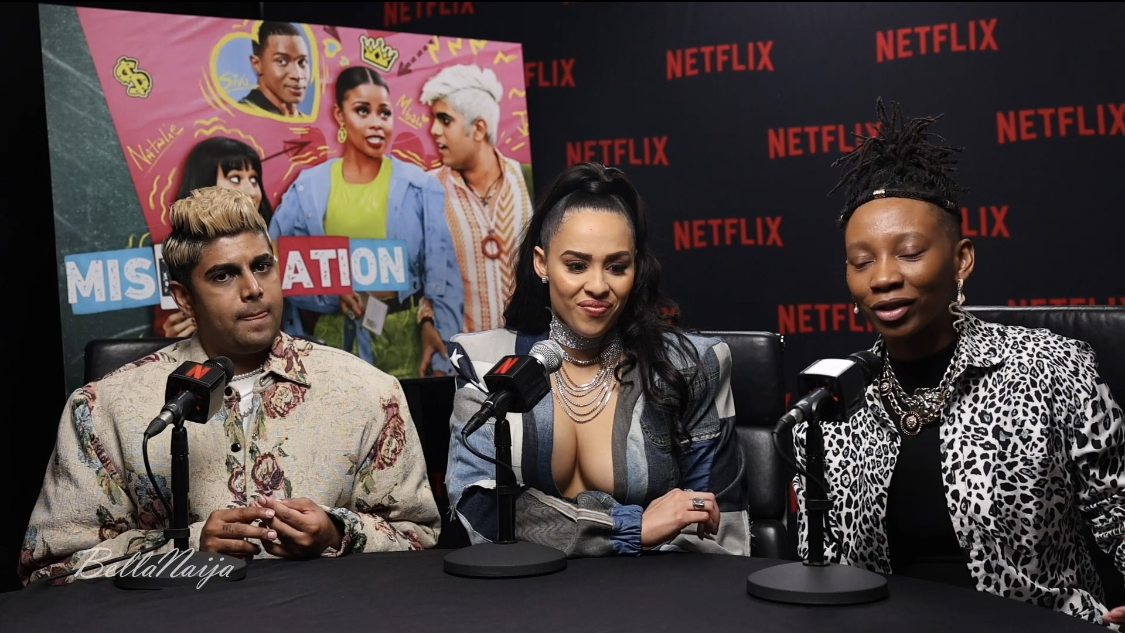
How did you prepare yourself for what we can imagine were challenging and possibly traumatic scenes in the series? Especially the one with Ceasar in the car.
Prev Reddy: So I think you know, Jay goes through a lot of highs and lows with his personal life and his relationships and that’s obviously a very pivotal moment in the show that I am going to let viewers watch first before I delve into and dissect what that scene actually means but what I can speak about is Jay’s openness about who he is, his sexuality, his wants, his needs, his desires were something that was very important to me because I think you know when you’re as open and as authentic to yourself as you’re, you tend to draw a lot of people that want to aspire to be who you are or maybe aspire is the wrong word; can’t necessarily find the bravery to be who you are so they want to be around you to sort of feed off that energy and I think there are a lot of Cesars around town and I just hope that Jay’s character and the many relationships he has helps people become more accepting of who they are.
What was it like working with the cast on this show?
Mandisa Nduna: Working with the other cast members of Miseducation was a beautiful experience. I knew about most of them from their work before, and I was really excited to be a part of it and just work out the chemistry between all the characters and find myself and see myself in that world. I knew that I had to step up my game and bring my A-game just so I could match the energies and the beautiful talents, especially for such a big platform as Netflix.
It was really beautiful, and we are all really great friends off-screen as well, so it was beautiful to take that chemistry from the screen to off-screen, where we cultivated really beautiful friendships outside.
Which theme of the series resonated the most with you?
Nicole Bessick: The interesting thing we have to remember about Raeeesah is that her world sort of exists completely separate from everybody else. A lot of the characters intertwine. You know, they have love stories and familial stories, but hers sort of stands alone. She’s got her own gossip column called “The Spill”. She’s got her fans, but it’s just her and her alone.
So two interesting themes came to mind for me: I mean, the show deals with a couple of important themes: the LGBTQI struggle and cancel culture, but where Raeeesah comes in, the themes that exist in her world are number one, relationship with self; a young woman trying to establish herself in a man’s world; and number two, power. What we must remember about Raeeesah is that she’s a billionaire’s daughter, and tapping into that, that kind of access, that kind of socioeconomic 1% way of living—those are not themes that exist regularly.
I didn’t grow up in the 1%, so those intangible things I have at my disposal—those were the themes I really had to get into—got into the inner tapestry of how the world works, and that’s how I brought it to life.
How has the acting journey been for you, and what does it feel like to be a movie star?
Prev Reddy: The journey has been unforgettable. I don’t think there are enough words to describe what it’s been like from the moment we had table reads to the first moment on set; everything has been a milestone, and I often refer to it as a fever dream because I know it happened, but sometimes I have to pinch myself to actually believe it happened. I don’t know that I feel like a star yet. I am always excited and grateful when my work is appreciated. Whether it’s a comedy or whether it’s on-screen or on stage,
You can’t think of yourself as a movie star. The core thing to longevity in this industry is humility. You treat everyone the same way, and every project is brand new. I always go into everything as if it’s my first project ever because you never stop learning, and so I am very excited for what the 15th may bring and what may happen afterwards, but until then, I am very grateful for the opportunities and the journey so far.
What does it mean to you to be on a Netflix show?
Mandisa Nduna: To be on a Netflix show is big to me because, as an actor, you want these kinds of global platforms. Now what we are seeing with the show airing in over 190 countries globally is the access that I suppose that gives me and my personal brand, so it’s very exciting to be aligned with such a superpower as a platform like this. I mean, first of many, I am sure. I am speaking it into existence.
How important are safe spaces?
Prev Reddy: Oh my gosh, incredibly important. I think the beautiful thing about this set is that we felt safe constantly; at least I can speak for myself. I knew that if there were intimate scenes, we had an intimacy coordinator, and if there were challenging scenes, I could go to Nicole. There were various people on set, various departments where you could go and openly air your grievances or your uncertainty that you are feeling, and I think that is so key in putting together a project like this where we were touching on some very heavy subjects, even though it’s a comedy, and even though we are actors and it’s our jobs, sometimes it’s okay to vent about how you’re really feeling about a scene, and I think there was no shortage of safe spaces offset.
Nicole Bessick: I think safe spaces are directly attributed to your connection as a cast, the faith you have in your crew, and how everything in the middle operates. We are friends off-screen. I think the chemistry you see on screen is a testament and shows exactly how tight we are in our trailers, at home, and on the weekends with one another. The safe spaces that work was created because, as Prev says, if there was a difficult moment personally or professionally, we do welcome those kinds of bits and pieces in our private lives, and we are just so loving and accepting of one another that we are able to create in a way that allows us this plethora of possibilities and safe creative spaces because of what we are doing off-screen. I know for a fact that this is not the case with most casts, and certainly in my career, which’s spanned over 10–12 years. I have never met a cast that looks after one another and has each other’s backs on and off screen in the way that we do.
Mandisa Nduna: It was just beautiful to be in a space curated by Burnt Onion Productions. Everybody was encouraged to make each other feel safe, and I think it says a lot about production on a professional level and also about the cast and crew on a personal level that everybody sort of adhered to those safety briefings and protocols and gave each other enough space for the other person to feel safe. I mean, kudos to the team for leading that.
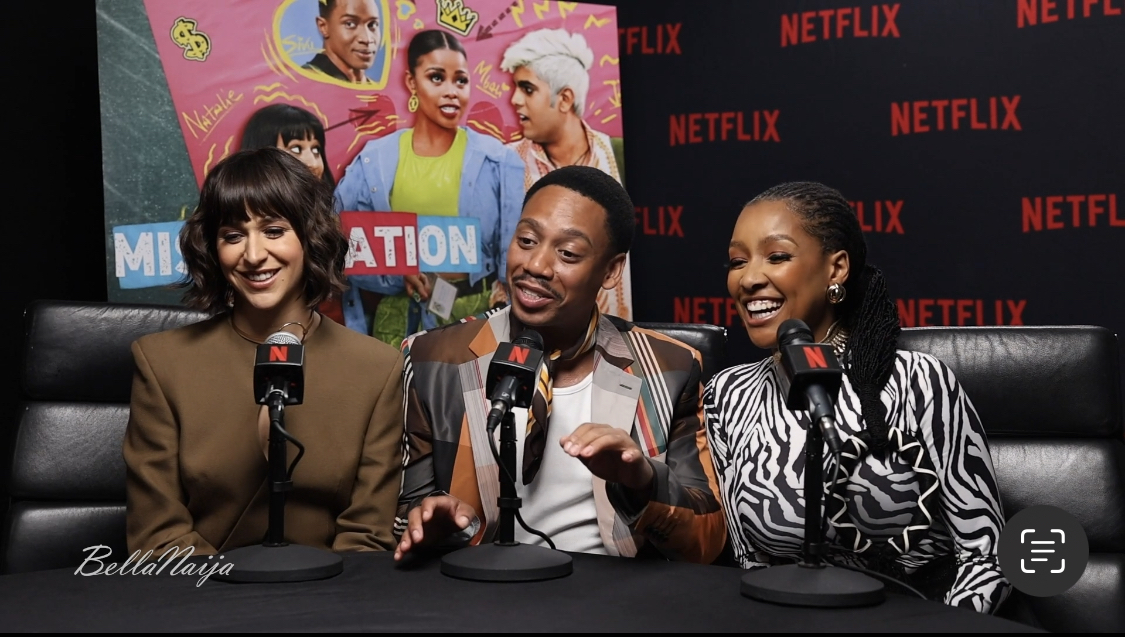
Micaela Tucker: Safe spaces are number one on the priority list, especially when you’re dealing with themes and topics that we do in Miseducation. It is important to feel heard and to feel safe in the environment that you’re growing, learning, exploring, and performing in, and to be able to showcase a character with truth and honesty.
What stood out to you in the story?
Sechaba Ramphele: I think it wasn’t necessarily a particular moment, but the general idea of the project is what stood out for me. I think it’s rare to have a project in South Africa that focuses on young adults or teenagers transitioning into young adulthood. That phase of life is so important and pivotal to a lot of people’s lives. Whether you’re going to university or moving out of high school into the real world, I think that moment is so important to capture. I think that stood out for me as a whole.
Natalie, do you think we can ever find a balance between what our parents think is right for us and what we want for ourselves, or should we always create our own paths?
Micaela Tucker: 100%. I mean, we are dealing with things that they never had to deal with. They can only guide us as far as they know, right? I think that we should always respect our parents’ advice, but we are going to have to take it in our own stride and in our own context. Some things are definitely universal and timeless, and you kind of have to figure things out for yourself. I mean, I always really take on what my parents say and then decide whether or not I am going to take it quite literally or more as background noise.
At the end of the first season, it felt like every single character had a motive to be desperate and even manipulative. Do you think that’s a perfect depiction of society today?
Mamarumo Marokane: Yes, we are humans at the end of the day, and I just love how miseducation reflects the different built emotions or themes that normal people go through, especially young people, so yeah, I love how it taps into that with different characters and different ways and how all of that comes together.
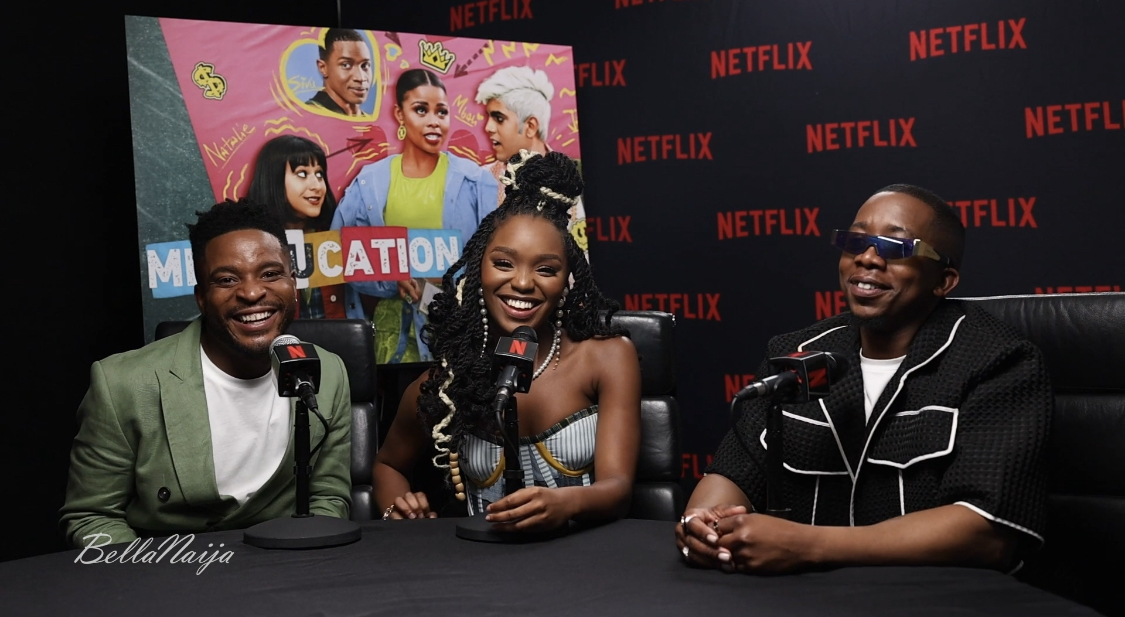
Aphiwe struggled with working, coming from a struggling background and the pressure of being the first to graduate in the family. How would you advise someone in that situation?
Luyanda Zwane: Apiwendima is going through a crisis that a lot of black students go through in South Africa. So for someone going through that position or that crisis, I would say, try to find your fighters.
She found her fighter, which was Caesar, the beacon of light, and she fought relentlessly for her dreams to come true. Do your research about different types of programmes, different types of bursaries, and different financial aid companies, and you will be okay. You will be fine.
Caesar, to the viewer, is a very conflicting figure. How challenging was it to play your role of villain, bully, and typical “revolutionary” politician/activist?
Mpho Sebeng: Firstly, to be honest, I didn’t see him as a villain. I thought he had his own cause; he may have been misunderstood, and he may have misunderstood himself. I definitely enjoyed playing his character because he was so layered. He wasn’t one thing. He was a lot of things, and people only saw a particular side to him. I think that we are who we are because of where we come from.
There are certain things that make us who we are, and I hope that people like Caesar will find help because I think that he’s someone who sort of suffers from a bit of megalomania, and what he really needs is therapy also because there are certain ideals about his identity that he’s not necessarily facing or coming to terms with.
View this post on Instagram
The post Exclusive: The Cast of Netflix’s “Miseducation” Reflect on their Journey, Character Development & On-Set Camaraderie appeared first on BellaNaija – Showcasing Africa to the world. Read today!.
